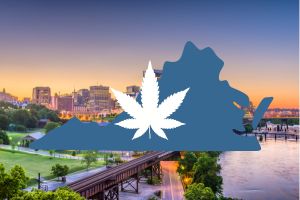Is Hemp Legal in Virginia?
Posted by Tweedle Farms on Oct 2nd 2021

The Commonwealth of Virginia, steeped in history and tradition, has recently found itself at the crossroads of a burgeoning revolution in the worlds of cannabis and hemp. Amidst changing national sentiments and evolving legal frameworks, Virginia has taken significant strides in redefining its stance on cannabis, particularly hemp flower. In this blog post, we’re going to attempt to unravel the complex tapestry of laws and regulations surrounding hemp in Virginia, with a spotlight on hemp flower (aka CBD flower) and THCA flower, providing some much-needed clarity on the green wave sweeping through the Old Dominion.
Understanding Hemp
Hemp flower, characterized by its low THC content, is a versatile crop with deep historical roots in American agriculture. Unlike its psychoactive counterpart, marijuana, CBD hemp flower boasts a THC concentration of 0.3% or less, distinguishing it legally and commercially. Virginia, with its rich agricultural heritage, has embraced hemp and its finished by-product hemp flower, recognizing its potential in textiles, construction materials, and, notably, its burgeoning role in the wellness sector through products like CBD oil, CBD flower, and various other hemp products.
Hemp Legislation in Virginia
The legal landscape of hemp and hemp flower in Virginia has been shaped by both federal and state legislation. The 2014 Farm Bill marked a pivotal moment, allowing states to initiate hemp research programs. Virginia responded by launching its Industrial Hemp Research Program, setting the stage for future developments. The subsequent 2018 Farm Bill was a game-changer, federally legalizing the cultivation of hemp and hemp flower, and removing hemp from the Controlled Substances Act, prompting Virginia to align its laws with these new federal guidelines, thereby fostering a regulated hemp industry within the state.
CBD Flower in Virginia
CBD flower is cherished for its rich cannabinoid profile, offering a non-psychoactive alternative to traditional THC-rich cannabis flowers. In Virginia, the legality of CBD flower hinges on its THC content; it must not surpass the 0.3% threshold. The state has implemented regulations to govern the sale and distribution of CBD flower, ensuring that products in the market adhere to this legal standard, thus safeguarding consumers and businesses alike.
THCA Flower in Virginia
THCA, or tetrahydrocannabinolic acid, is a non-psychoactive cannabinoid found in fresh cannabis plants, which converts to THC, and becomes intoxicating, upon decarboxylation (heating). In Virginia, the legal status of THCA flower is nuanced; while THCA itself is not psychoactive, the inevitable conversion of THCA to THC places emphasis on the total THC content in the final product. Virginia law mandates that CBD flower and hemp products, including those containing THCA, must not exceed the 0.3% THC limit, ensuring compliance with both state and federal regulations.
Regulatory Framework for Hemp
Virginia's Department of Agriculture and Consumer Services (VDACS) oversees the state’s growers of hemp flower, administering licenses for cultivation and processing and ensuring compliance with state and federal laws. The regulatory framework is designed to support the hemp industry's growth while maintaining public safety, requiring rigorous testing for THC levels and contaminants in all hemp flower and hemp products, and adherence to labeling and marketing guidelines.
Market and Economic Impact
The legalization of CBD hemp flower has opened new avenues for economic development in Virginia. The state's agricultural sector, traditionally known for tobacco and peanuts, is now exploring the potential of hemp flower, driven by growing demand for CBD and hemp-derived products. This shift presents opportunities and challenges, from navigating regulatory landscapes to meeting consumer demand for safe and effective products.
Consumer Safety and Public Awareness
Consumer education is paramount in the evolving hemp flower market. Virginia has taken steps to ensure that consumers are informed about the products they purchase, emphasizing the importance of understanding labeling, particularly regarding CBD flower and its possible THC content. Public awareness campaigns and educational resources are crucial in building a knowledgeable consumer base, fostering a safe and responsible market for hemp flower and hemp products.
Future Outlook for Hemp in Virginia
As the demand for CBD hemp flower and hemp products continues to mature, Virginia stands at the forefront of innovation and legislative progress. Ongoing research into hemp flower cultivation, processing, and product development, coupled with a dynamic regulatory environment, promises to shape the future of the industry. Advocacy and informed community engagement will be key in navigating the challenges and seizing the opportunities that lie ahead in Virginia's green landscape.
Conclusion
The journey of hemp flower in Virginia is a testament to the state's adaptability and forward-thinking approach to cannabis. From the fields of industrial hemp to the shelves of CBD and hemp flower products, Virginia is carving out a niche in the national cannabis narrative. As we look to the future, the continued evolution of hemp laws and the industry's growth hold great promise for the Commonwealth, heralding a new era of agricultural innovation and economic prosperity.



